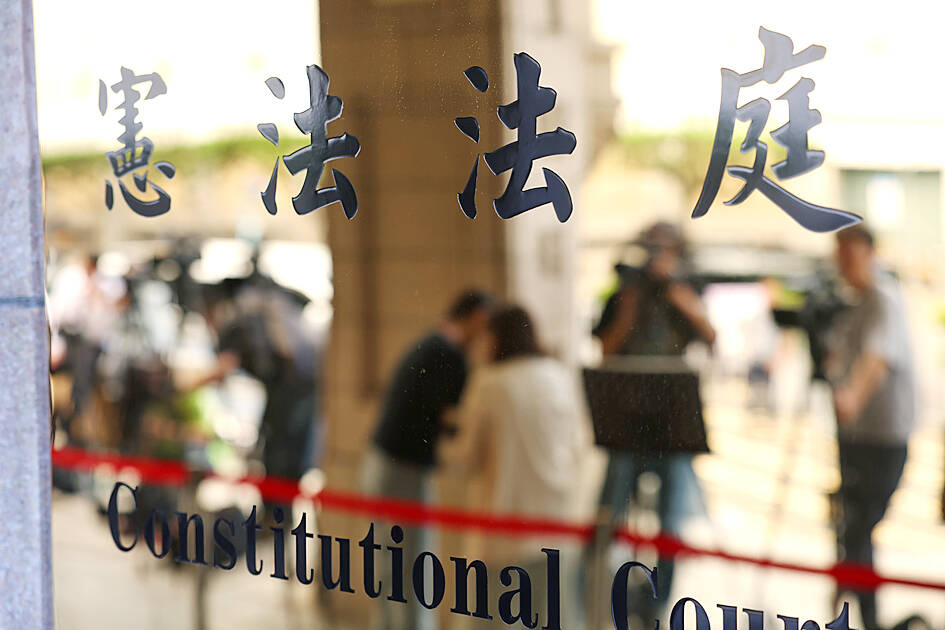The 37 death row prisoners in Taiwan who have exhausted their appeals may petition for extraordinary appeals to alter their sentencing following a ruling by the Constitutional Court on Friday that stated the death penalty was constitutional, but only for “exceptional” cases.
In a case brought by the 37 prisoners, the Constitutional Court ruled that the death penalty was constitutional only for “the most serious” premeditated murders and premeditated crimes resulting in death.
The ruling also prohibits the death sentence for people with a mental condition, reversing the current practice which allows only those who can prove that their mental conditions had affected their judgment when they committed their crimes to receive reduced sentences.

Photo: CNA
Any current laws incompatible with the ruling must be amended within two years, the court said.
At a news conference following the ruling, Yang Hao-ching (楊皓清), the court’s director-general, said while the death row prisoners could petition for extraordinary appeals based on Friday’s ruling, it was up to the head prosecutor of the Supreme Prosecutors’ Office to decide whether to accept their petitions.
Even if the head prosecutor files for extraordinary appeals on their behalf, the Supreme Court still has to decide whether to review such appeals, he added.
The Supreme Prosecutors’ Office in a press release issued later on Friday said it would file extraordinary appeals for prisoners Chen Yi-lung (陳憶隆) and Huang Chun-chi (黃春棋) because the laws underlying their death sentences were ruled unconstitutional by the Constitutional Court.
The two were given the death penalty more than two decades ago over the kidnapping and murder of a businessman surnamed Huang (黃) in 1995.
As for the remaining 35 prisoners, the office said it would examine each of their cases before determining its next step.
The Code of Criminal Procedure (刑事訴訟法) says that the head prosecutor can also file for an extraordinary appeal — a special procedure intended to correct “improper judgments” — if a punishment imposed on an individual is considered to be “against the law.”
The Supreme Court, upon reviewing an extraordinary appeal for a case, can revoke parts or all of the judgments and either remit the case to the original court for re-examination or issue a new ruling, according to the extraordinary appeal system.

Police have issued warnings against traveling to Cambodia or Thailand when others have paid for the travel fare in light of increasing cases of teenagers, middle-aged and elderly people being tricked into traveling to these countries and then being held for ransom. Recounting their ordeal, one victim on Monday said she was asked by a friend to visit Thailand and help set up a bank account there, for which they would be paid NT$70,000 to NT$100,000 (US$2,136 to US$3,051). The victim said she had not found it strange that her friend was not coming along on the trip, adding that when she

INFRASTRUCTURE: Work on the second segment, from Kaohsiung to Pingtung, is expected to begin in 2028 and be completed by 2039, the railway bureau said Planned high-speed rail (HSR) extensions would blanket Taiwan proper in four 90-minute commute blocs to facilitate regional economic and livelihood integration, Railway Bureau Deputy Director-General Yang Cheng-chun (楊正君) said in an interview published yesterday. A project to extend the high-speed rail from Zuoying Station in Kaohsiung to Pingtung County’s Lioukuaicuo Township (六塊厝) is the first part of the bureau’s greater plan to expand rail coverage, he told the Liberty Times (sister paper of the Taipei Times). The bureau’s long-term plan is to build a loop to circle Taiwan proper that would consist of four sections running from Taipei to Hualien, Hualien to

The Civil Aviation Administration yesterday said that it is considering punishments for China Airlines (CAL) and Starlux Airlines for making hard landings and overworking their cabin crew when the nation was hit by Typhoon Kong-rey in October last year. The civil aviation authority launched an investigation after media reported that many airlines were forced to divert their flights to different airports or go around after failing to land when the typhoon affected the nation on Oct. 30 and 31 last year. The agency reviewed 503 flights dispatched by Taiwanese airlines during those two days, as well as weather data, flight hours

Three people have had their citizenship revoked after authorities confirmed that they hold Chinese ID cards, Mainland Affairs Council (MAC) Deputy Minister and spokesman Liang Wen-chieh (梁文傑) said yesterday. Two of the three people were featured in a recent video about Beijing’s “united front” tactics by YouTuber Pa Chiung (八炯) and Taiwanese rapper Chen Po-yuan (陳柏源), including Su Shi-en (蘇士恩), who displayed a Chinese ID card in the video, and taekwondo athlete Lee Tung-hsien (李東憲), who mentioned he had obtained a Chinese ID card in a telephone call with Chen, Liang told the council’s weekly news conference. Lee, who reportedly worked in